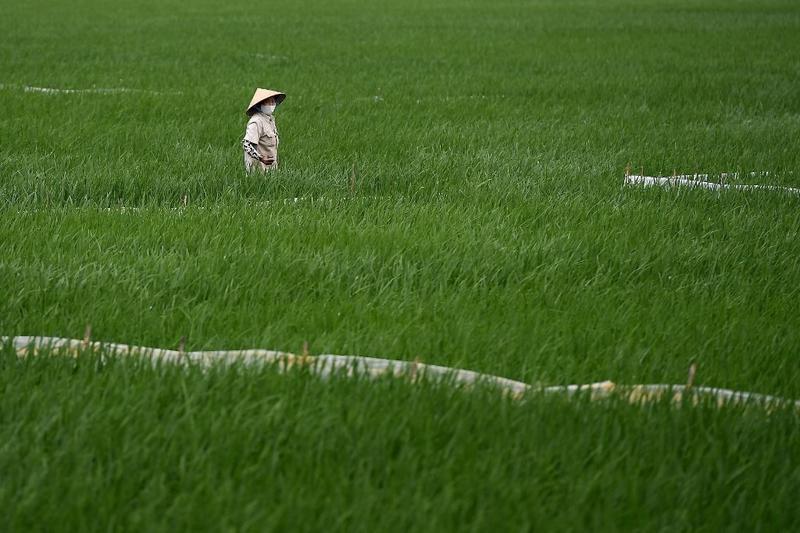 A farmer wearing a face mask as a preventive measure against the spread of the novel coronavirus, works in a rice paddy in Hanoi on March 30, 2020.
(NHAC NGUYEN / AFP)
A farmer wearing a face mask as a preventive measure against the spread of the novel coronavirus, works in a rice paddy in Hanoi on March 30, 2020.
(NHAC NGUYEN / AFP)
ROME - World food prices fell sharply in March, hit by a drop in demand tied to the coronavirus pandemic and a plunge in global oil prices, the United Nations food agency said on Thursday.
The Food and Agriculture Organization (FAO) food price index, which measures monthly changes for a basket of cereals, oilseeds, dairy products, meat and sugar, averaged 172.2 points last month, down 4.3 percent on February.
READ MORE: World food security at risk with export curbs, spike in import
The price drops are largely driven by demand factors, not supply, and the demand factors are influenced by ever-more deteriorating economic prospects
Abdolreza Abbassian, FAO senior economist
“The price drops are largely driven by demand factors, not supply, and the demand factors are influenced by ever-more deteriorating economic prospects,” said FAO Senior Economist Abdolreza Abbassian.
FAO also slightly increased its forecast for cereal production, predicting a crop totalling some 2.721 billion tons in 2019, up from a previous forecast of 2.719 billion and some 2.4 percent higher than the 2018 crop.
FAO’s sugar price index posted the biggest fall, down 19.1 percent from the previous month. The drop was triggered by a reduction in consumption linked to the virus lockdowns seen in many countries, and lower demand from ethanol producers due to the recent dive in crude oil prices, the Rome-based agency said.
The vegetable oil price index slumped 12 percent, pushed down by sliding palm oil prices which was linked to a plunge in crude mineral oil prices and growing uncertainty over the impact of coronavirus on the market.
“Oil prices have fallen by more than half during the past month, which catalyzes a large downward impact on biofuels, which are an important source of demand in the markets for sugar and vegetable oils,” said FAO analyst Peter Thoenes.
ALSO READ: Stop panic buying, export bans to prevent food crisis
The dairy price index dropped 3 percent, driven by declining quotations and slowing global import demand for skim and whole milk powders, while the meat index fell by 0.6 percent.
The cereal price index fell 1.9 percent, with rice prices bucking the downward trend, rising for the third month running, buoyed by stockpiling spurred by concerns over the pandemic and reports that Vietnam might introduce export bans.
FAO said Vietnam had since downplayed the reports.
While FAO lifted its forecast for 2019 world cereal production, its estimate for 2020 wheat production remained unchanged at 763 million tonnes, close to last year’s record level.
“(This) coupled with ample inventories, will help shield food markets from turmoil during the coronavirus storm,” FAO predicted.


